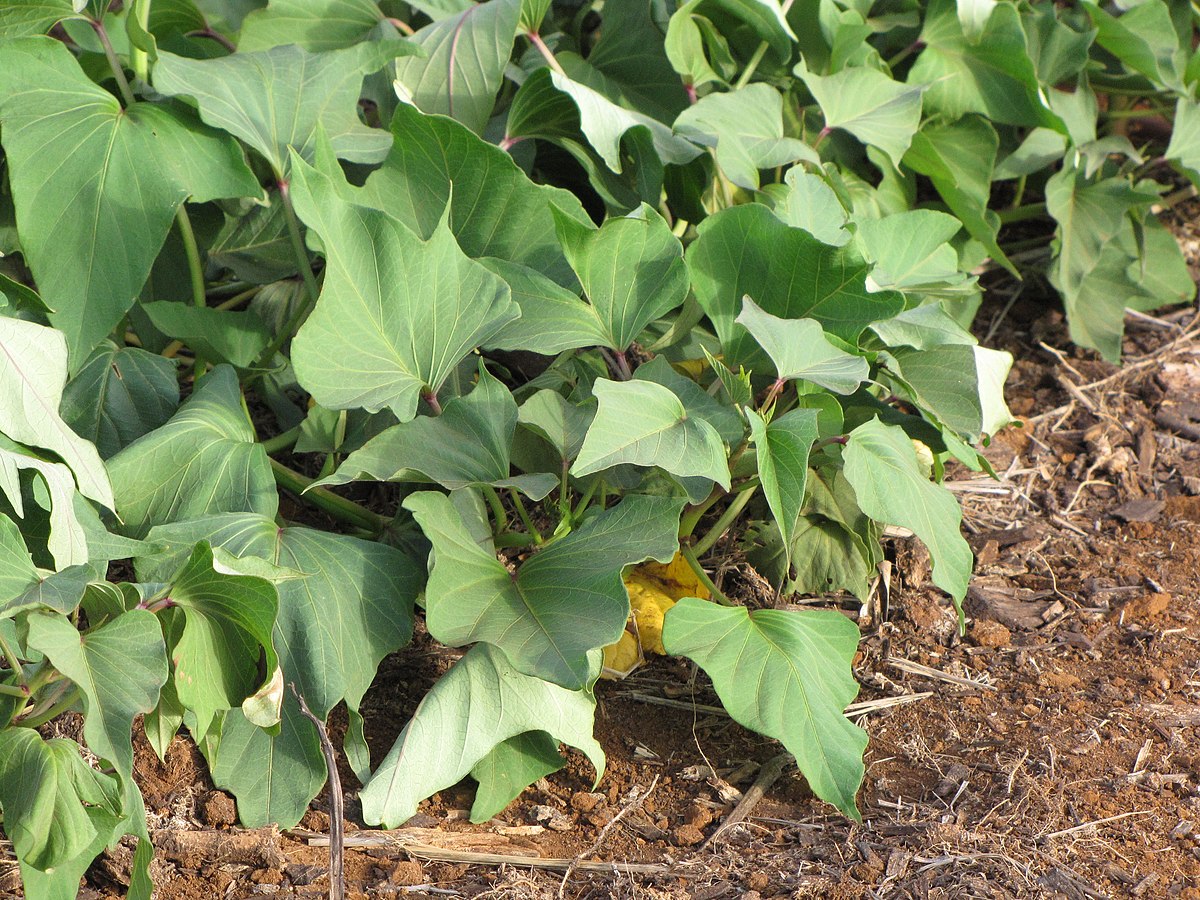An online post claiming the extract from “talbos ng kamote” or leaves of sweet potatoes can “kill cancer” has been widely circulating on Facebook (FB) for the past three months.
VERA Files Fact Check looked into this and seven other claims made in the post, and found that only half are true. The rest are either misleading, inaccurate, or unsubstantiated.
STATEMENT
On July 31, Facebook (FB) page Philippine Health Tips, which posts herbal cures and health benefits of various plants on an almost-daily basis, published on FB a post titled,
“TALBOS NG KAMOTE (Sweet potato leaves) KILLS CANCER
Sweet Potato Leaves Kill 94% of Prostate Cancer Cells in Vitro.”
Citing several unidentified studies which supposedly tested the effects of sweet potato leaves and their extract on humans and mice, the page also claimed the following:
- the extract slows the growth of prostate cancer tumors in mice by 75%;
- sweet potato leaves are “active against” leukemia, as well as breast, lung, colon, and stomach cancer;
- eating at least 100 grams per week of the leaves “decreases lung cancer risk by up to 57%”;
- the plant’s leaves “boosts immunity” in humans and lowers blood sugar in mice with type II diabetes;
- sweet potato leaves are “an excellent source” of antioxidants called polyphenols, and anticancer peptides;
- it gives “400% the alkalizing (sic) power of pure lemon juice”; and
- the leaves significantly relieved fatigue in mice, increased exercise capacity, and boosted muscle glycogen levels.
To date, the post has been shared over 84,000 times.
FACT
Only the claims about the effect of sweet potato leaves and extract on mice are true, as well as the statement about the plant containing antioxidants.
The two claims that the plant can fight specific cancers in humans are skewed, while Philippine Health Tips’ claims of its lung-cancer-preventing capabilities carry inaccuracies. The claim on its “alkalizing (sic) power,” on the other hand, is unsubstantiated.
On being extremely toxic to prostate cancer cells, killing 94% in vitro
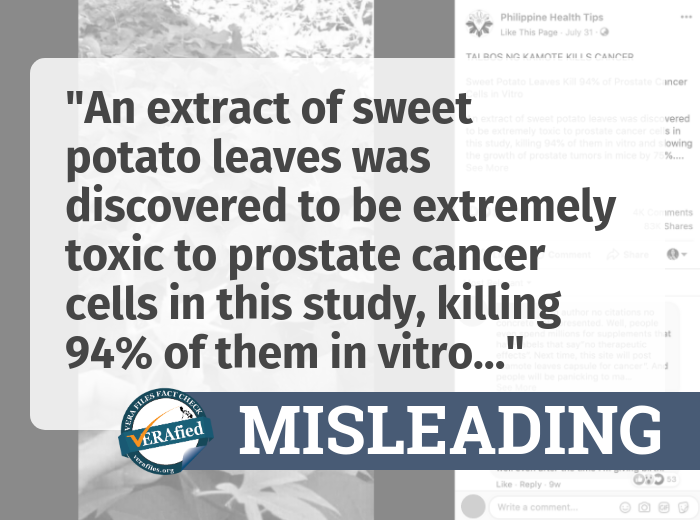
Philippine Health Tips’ main claim is misleading. The FB page did not specify which study this came from, but it appears to refer to a 2011 research from the Oxford Journals on Carcinogenesis. The study did not say the extract is “extremely toxic” to prostate cancer cells, but did find that it had significant, “antiproliferative” effect on prostate cancer cells — meaning it prevents cancerous cells from reproducing — while not causing any “detectable toxicity” on normal prostate cells. It also induced “apoptosis” or cell self-destruction in human prostate cancer cells.
The research was done on prostate cancer cells in vitro, or in an artificial setting like test tubes or petri dishes, and in vivo, or inside a living organism’s body. The study did not say 94 percent of cancerous cells were killed in vitro. What it did observe was that oral intake of the extract “inhibited growth and progression” of prostate tumors by about 69 percent in lab mice.
On being “active” against breast, lung, colon and stomach cancer and leukemia
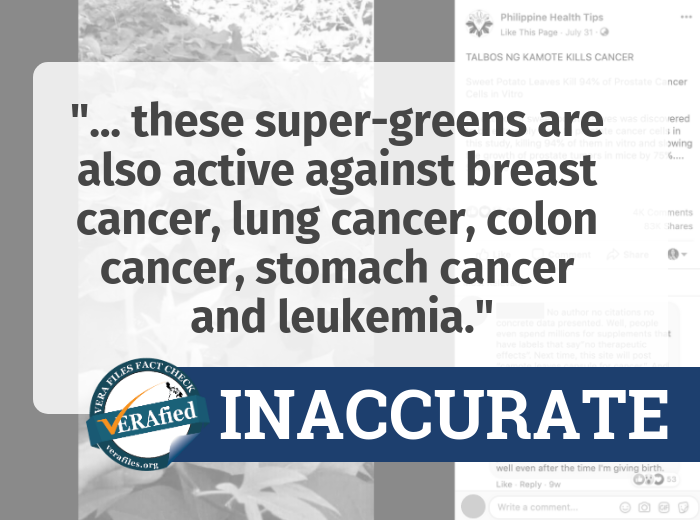
While several studies have indeed found that sweet potato leaves and its extract can fight colon and stomach cancer and leukemia, and can help prevent lung cancer, the leaves’ efficacy against breast cancer cells has yet to be proven. However, there are published studies not on the leaves but on the root crop’s anti-breast cancer activities, such as a 2015 research in Taiwan, and a 2017 and 2019 study in China.
On decreasing the risk of lung cancer by 57% by eating 100g of sweet potato leaves weekly
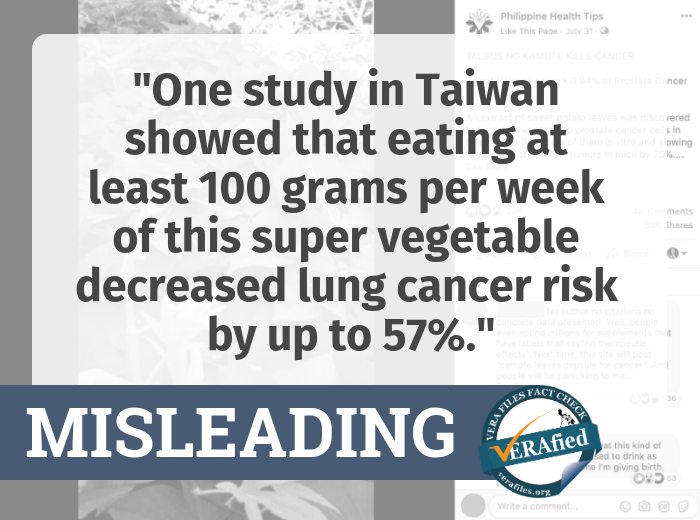
A research conducted in Taiwan on the matter did not make specific mention of a 57 percent decrease in lung cancer risk caused by the intake of sweet potato greens. Instead, its results pointed out what most people know: that eating more servings of vegetables, chrysanthemum, and sweet potato leaves — which are all rich in vitamin A — decreases the chances of an individual developing lung cancer.
On having 400% the alkalizing power of pure lemon juice
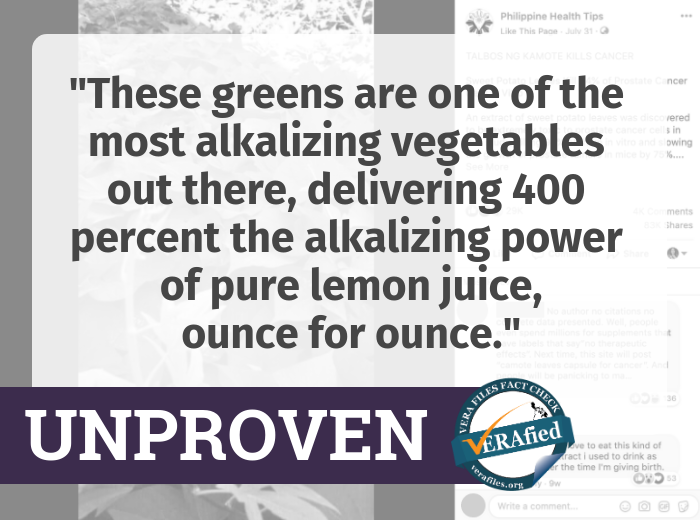
This claim lacks proof. There are no scientific studies pointing to sweet potato leaves or its extract having 400 percent more alkaline than lemon juice.
On boosting the immune system of humans and lowering blood sugar in diabetic mice
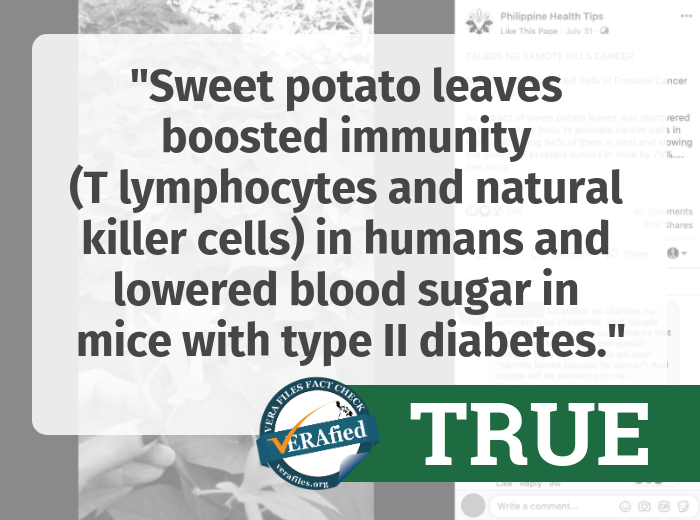
A 2005 study in Taiwan on the effect of purple sweet potato leaves does show it can help in regulating a human’s immune functions, proving the former claim, while a 2014 experiment in Japan on how sweet potato greens extract (SPGE) weakens hyperglycemia or high blood sugar in mice, showing an antidiabetic potential of sweet potato leaves, validates the latter.
On being a source of polyphenols and anticancer peptides
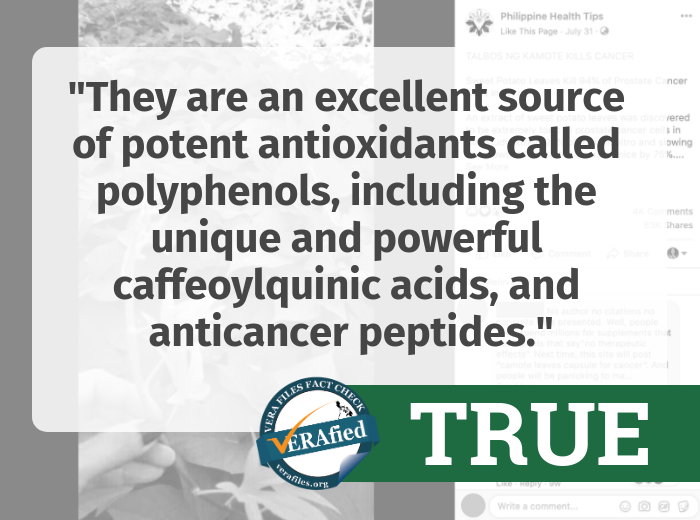
Several studies cited in this story prove that sweet potato leaves contain polyphenols and anticancer peptides, specifically the 2007 study which discovered that the spread of colon, stomach, and leukemia cancer cells could be suppressed by a substance found in the polyphenols of sweet potato greens.
On sweet potato extract slowing the growth of prostate tumors in mice by 75%
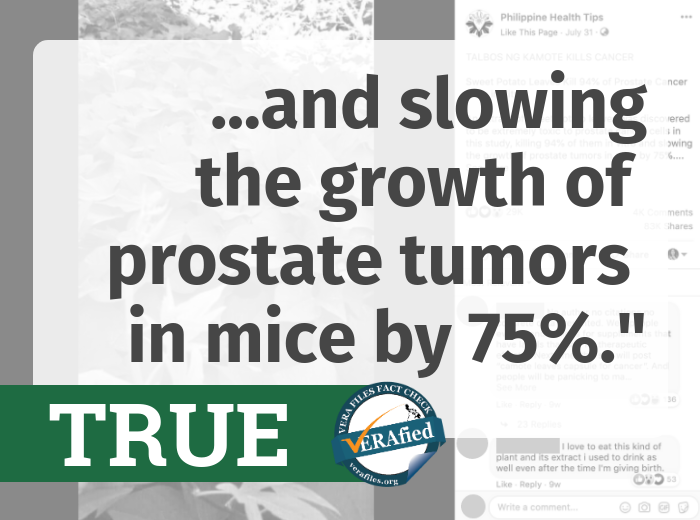
A 2013 study by the same researchers of the 2011 in vivo and in vitro research mentioned above found that ingesting a polyphenol-rich portion of sweet potato green extract could hinder the development of prostate tumor in mice by approximately 75 percent.
On relieving fatigue, increasing exercise capacity and muscle glucose in mice
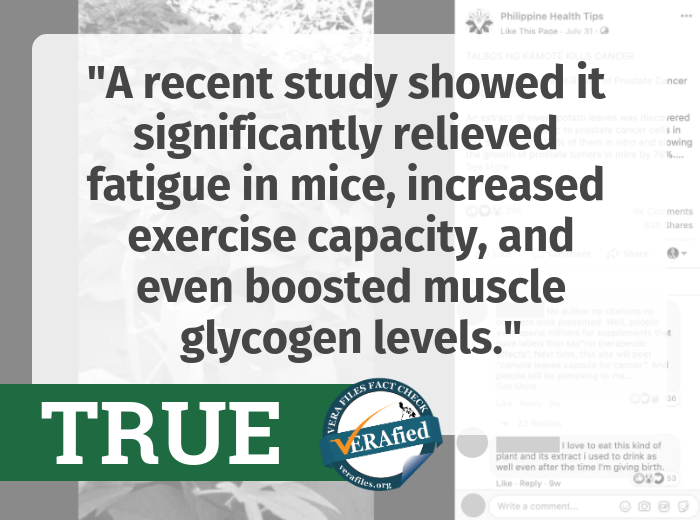
The claim pertains to a 2013 research published in the Indian Journal of Biochemistry & Biophysics. It looked into the anti-fatigue effects of flavonoids found in sweet potato greens. Flavonoids are phytochemicals reported to have “antiviral, anti-allergic, anti-platelet, anti-inflammatory, antitumor, and antioxidant activities.”
The male Kunming mice, which received flavonoids from sweet potato leaves during the experiment, were able to swim longer and had higher muscle glucose content or stored energy after performing the exercise.
Sources
Karna, P., Gundala, S. R., Gupta, M. V., Shamsi, S. A., Pace, R. D., Yates, C., Narayan, S., & Aneja, R. (2011). Polyphenol-rich sweet potato greens extract inhibits proliferation and induces apoptosis in prostate cancer cells in vitro and in vivo. Oxford Journals on Carcinogenesis, 32(12), 1872–1880.
Kurata, R., Adachi, M., Yamakawa, O., & Yoshimoto, M. (2007). Growth Suppression of Human Cancer Cells by Polyphenolicsfrom Sweetpotato (Ipomoea batatasL.) Leaves. Journal of Agricultural and Food Chemistry, 55,185−190.
Jin, Y.R., Lee, M.S., Lee, J.H., Hsu, H.K., Lu, J.Y., Chao, S.S., Chen, K.T., Liou, S.H., & Ger, L.P. (2007). Intake of vitamin A-rich foods and lung cancer risk in Taiwan: with special reference to garland chrysanthemum and sweet potato leaf consumption. Asia Pacific Journal of Clinical Nutrition, 16(3), 477-488.
Sugata, M., Lin, C.Y., & Shih, Y.C. (2015). Anti-Inflammatory and Anticancer Activities of Taiwanese Purple-Fleshed Sweet Potatoes (Ipomoea batatas L. Lam) Extracts. BioMed Research International. Retrieved from https://www.hindawi.com/journals/bmri/2015/768093/
Li, Z., Yu, Y., Wang, M., Xu, H., Han, B., Jiang, P., Ma, H., Li, Y., Tian, C., Zhou, D., Li, X., & Ye, X. (2017). Anti-breast Cancer Activity of SPG-56 from Sweet Potato in MCF-7 Bearing Mice in Situ through Promoting Apoptosis and Inhibiting Metastasis. Scientific Reports, 9, 146(2019) doi:10.1038/s41598-018-29099-x
Jiang, P., Han, B., Jiang, L., Li, Y., Yu, Y., Xu, H., Li, Z., Zhou, D., Jia, X., Li, X., & Ye, X. (2019). Simultaneous separation and quantitation of three phytosterols from the sweet potato, and determination of their anti-breast cancer activity. Journal of Pharmaceutical and Biomedical Analysis, 174, 718-727.
Chen, C.M., Li, S.C., Lin, Y.L., Hsu, C.Y., Shieh, M.J., & Liu, J.F. (2005). Consumption of purple sweet potato leaves modulates human immune response: T-lymphocyte functions, lytic activity of natural killer cell and antibody production. World Journal of Gastroenterology, 11(37), 5777–5781.
Nagamine, R., Ueno, S., Tsubata, M., Yamaguchi, K., Takagaki, K., Hira, T., Hara, H., & Tsuda, T. (2014). Dietary sweet potato (Ipomoea batatas L.) leaf extract attenuates hyperglycaemia by enhancing the secretion of glucagon-like peptide-1 (GLP-1). Royal Society of Chemistry Food and Function Journal. Retrieved from https://pubs.rsc.org/en/content/articlelanding/2014/FO/C4FO00032C#!divAbstract
Gundala, S.R., Yang, C., Lakshminarayana, N., Asif, G., Gupta, M.V., Shamsi, S., & Aneja, R. (2013). Polar biophenolics in sweet potato greens extract synergize to inhibit prostate cancer cell proliferation and in vivo tumor growth. Oxford Journals on Carcinogenesis, 34(9), 2039-2049.
Li, C., & Zhang, L. (2013). In vivo Anti-fatigue activity of total flavonoids from sweet potato [Ipomoea batatas (L.) Lam.] leaf in mice. Indian Journal of Biochemistry & Biophysics, 50, 326-329.
(Guided by the code of principles of the International Fact-Checking Network at Poynter, VERA Files tracks the false claims,
flip-flops, misleading statements of public officials and figures, and debunks them with factual evidence. Find out more about this initiative and our methodology.)

